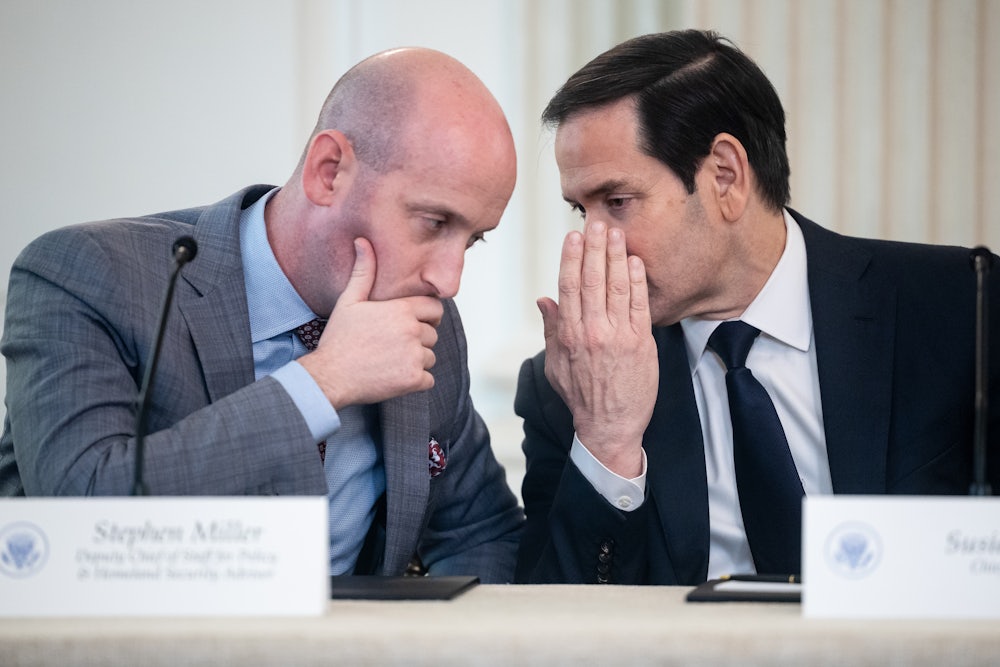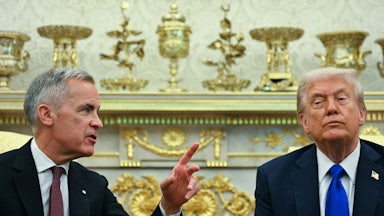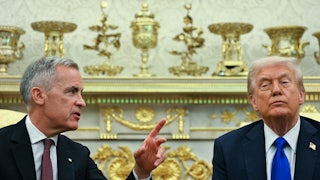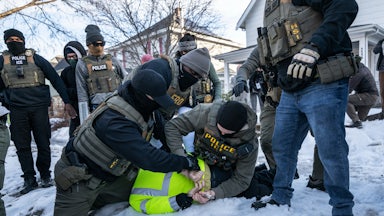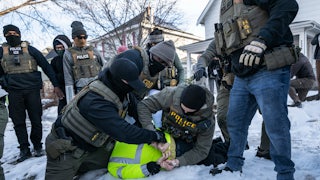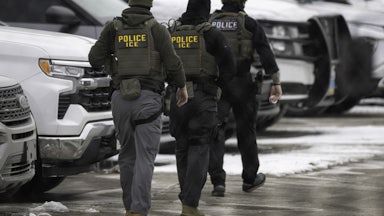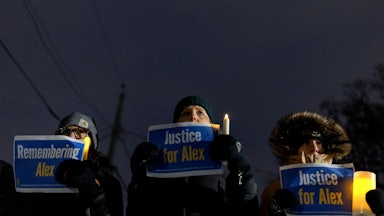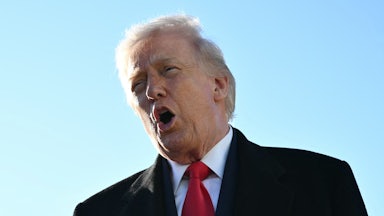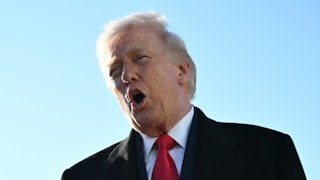How’s this for history repeating? The mainstream American media is botching its coverage of the Trump administration’s mounting military threats to Venezuela, and that failure is contributing to what looks to be a prolonged and violent disaster for both nations. Some experts inside Venezuela are warning that a U.S. armed effort at “regime change” could detonate years of brutal chaos there, much like Iraq in the years after the 2003 American invasion.
The media’s incompetence continues despite a major news event that should have instigated higher scrutiny and better reporting—the Nobel Committee has just honored the pro-democracy forces inside Venezuela by awarding the Peace Prize to one of its leaders, Maria Cortina Machado. This event, coming as it did inside a bubble of pure hype surrounding President Donald Trump’s doomed campaign to sway the Nobel Committee into handing him the award, should have been a flashing light alerting the press that a bigger story is already afoot in Venezuela.
It’s not certain that the message has gotten through. Meanwhile the media’s failures are stacking up.
In the first place, the press has missed the most important truth about Venezuela: the shocking dimensions of the country’s economic collapse. A brilliant Venezuelan economist, Francisco Rodriguez, explains that per-capita income dropped 71.5 percent from 2012 to 2020, which was “the equivalent of three Great Depressions.” He told me that the collapse is not only the most injurious in the history of Latin America, but is also “the greatest anywhere in the entire world that was not the consequence of war.” Some eight million Venezuelans, a quarter of the population, have already fled into exile, which sets a record for the Western hemisphere. Of those refugees, some 800,000 ended up in the United States. This on its own should have prompted the American press into more profound inquiry.
My sources inside the country also warn that a U.S. large-scale attack as part of a regime change effort could destroy the already weakened civil authority and strengthen dangerous paramilitary and armed criminal groups. The resulting humanitarian catastrophe would reverberate across our entire hemisphere. None of these dangerous consequences have been analyzed in the U.S. media.
Moreover, Venezuela’s crisis is in part due to a bipartisan political failure in the United States, which has also been ignored in the major American newspapers and cable news networks. During Donald Trump’s first term, he sharply escalated the economic warfare against Venezuela, shutting off most exports and imports. But the Biden administration failed to end the pressure, aside from a few feeble, mostly token measures. The combined Trump-Biden economic onslaught worsened the already existing crisis.
Additionally, the U.S. media is also not emphasizing sufficiently that fentanyl, which was responsible for three-quarters of the 105,000 overdose deaths in the U.S. in 2023—is not smuggled in from Venezuela at all. Fentanyl is easily the most dangerous of the illegal drugs, so Trump’s insinuations that Venezuela is hugely responsible for American deaths is a lie. The truth also should shatter the administration’s already dishonest justifications for murdering boatloads of Venezuelans on the high seas. Meanwhile, the economic crisis in Venezuela grinds on—and a U.S. invasion would add to the tragedy.
Jesus “Chuo” Torrealba, a well-known journalist in Caracas with a daily radio program, is 67 years old and has been a significant figure in Venezuela’s opposition for decades. He has one million followers on X, formerly Twitter. He is intense as he warns about the dangerous consequences of an American military attack: “Over the years of economic and political crisis, Venezuela’s central government has lost control over many spaces in our national territory. Government authority has been replaced by armed groups that are not controlled by the state. There are guerrilla organizations of several types. Illegal gold mining has become lucrative, and is protected by other armed groups. There are narco-trafficking organizations. Some of these large-scale armed criminal enterprises have significant financing.”
Torrealba continued: “What’s more, some high-ranking military officials are linked to various criminal enterprises. As military, they have access to heavy weapons—artillery, armored vehicles. Many of these groups will fight anyone to protect their interests, including even possible American occupation forces.”
He also said that “the vast majority of casualties would be civilians.” He added: “We have the recent examples of Gaza and Ukraine to remind us. And here, the price in blood will be paid by the poorest Venezuelans, not those who are safely promoting a violent American invasion online.”
Phil Gunson, who has been based in Caracas for 26 years, the last 10 as a senior analyst for the respected International Crisis Group, shares Torrealba’s fears about the dangerous consequences of regime change. “U.S. military action could trigger a crisis on the same order as happened in Iraq after the U.S. regime change effort there,” he said. “If the U.S. does decapitate the government, the multiple armed actors could bring about a degree of anarchy. None of these different groups have any incentive to just lay down their arms. There have been several decades of accumulated resentments on various sides, and it’s not fanciful to imagine that there could be lynchings. There could be bombings or selective assassinations.”
As to whether a regime change war is inevitable, there is no clear consensus. Other knowledgeable observers remain skeptical that the U.S. will actually launch a full-scale attack. They point out, rightly, that the 1989 invasion of Panama, the closest recent parallel, required 27,000 American troops to take over a country of 2.5 million people. So far, the U.S. has “only” 6,500 soldiers in the Trump-mandated Caribbean task force, and Venezuela’s population (28.5 million) is 11 times that of Panama in the late 1980s.
Let’s hope the skeptics are right. But the Trump administration is unlike any other in U.S. history. Two major hawks, Marco Rubio and Stephen Miller, are pushing the hard-line policy toward Venezuela, each apparently bent on outdoing the other. Rubio is thought to be setting up a presidential run in 2028. Miller has a pathological hatred of Latinos dating back to his youth (chronicled in a superb biography, Hatemonger, by Jean Guerrero). There are signs that either or both are convincing an increasingly addled Donald Trump to launch a more lethal air war, and possibly even an invasion. Surely many mainstream reporters are aware of Rubio’s and Miller’s true motivations, but the conventions of corporate journalism mean they have to ignore them and pretend in their reports that the arguments are purely principled differences over policy.
There is absolutely no doubt that Venezuela’s internal opposition, led by the Nobel Prize winner, Maria Cortina Machado, won the July 2024 election in a landslide and that its candidate, Edmundo González Urrutia, should be sitting in the Miraflores presidential palace instead of Nicolás Maduro. What’s more, the Maduro regime continues to hold political prisoners; Torrealba cited the case of Enrique Márquez, a moderate former presidential candidate who was jailed only because he publicly doubted the fraudulent election results. Torrealba said, “For many months Márquez was held incommunicado, which is a form of torture.”
It is also the case that some within Venezuela support increased pressure from outside; in certain cases that support includes backing an actual U.S. invasion. (My sources explain that pollsters do not conduct opinion surveys on the subject; they would be afraid to publish the results, and in any case many Venezuelans would be too fearful to tell the truth over the telephone.) Elias Ferrer, who edits La Guacamaya, a valuable English-language publication in Caracas, recognizes that frustrated Venezuelans may see no alternative. (La Guacamaya means “The Macaw”; the colorful bird is a national symbol.)
Ferrer explains: “There are a lot of people here who think that some kind of U.S. intervention is a good idea. They think it’s going to be like one of those action movies, and end quickly. They don’t understand, for instance, that a U.S. bombing campaign would mean that innocent civilians will die. That’s what happens in modern warfare.”
Meanwhile, Chuo Torrealba is enthusiastic because Machado was just awarded the Nobel Peace Prize. She is still in Venezuela, in hiding. He says that the prize was meant to honor all Venezuelans in the pro-democracy movement and that she is their representative. He looked closely at how the prize committee actually worded the award. Here is part of the official announcement: “She is receiving the Nobel Peace Prize for her tireless work promoting democratic rights for the people of Venezuela and for her struggle to achieve a just and peaceful transition from dictatorship to democracy.”
He continued: “The prize is both an honor and a promise for the future. The prize does recognize the achievements by her and our movement so far. But it is also a pledge. The key words in the award are ‘just’ and ‘peaceful.’ The Nobel Committee is not honoring violent efforts to stage a coup d’état. It is not honoring a possible military invasion. And the committee is certainly not honoring the fact that the American military has already murdered 21 people in small boats on the high seas.”
Changes in American policy could start to bring relief immediately—and, in fact, another figure in the Trump administration had been trying to ease the tensions stoked by others. Richard Grenell, a special presidential envoy and sometime Trump confidant, had even met regularly with Maduro, and the U.S. had relaxed some sanctions on oil exports—until the Rubio-Miller hard-line faction won the turf battle and Trump ordered Grenell to stop talking.
It would be especially tragic if the U.S. invades and our soldiers kill Venezuelans, because we have a long and mostly friendly history with the country. Here’s just one example. Oil was discovered there early on, in 1914, and American oil workers imported baseball. It has long been the country’s national sport. Venezuelans started playing in America’s major leagues back in the 1950s; some 63 Venezuelans were on this year’s opening-day baseball rosters. Older fans in both Chicago and Baltimore revere shortstop Luis Aparicio, as a great team player and a likable gentleman back in the 1950s and ’60s. (Aparicio is still alive at 93, the oldest member of baseball’s Hall of Fame.) More recently, Oswaldo “Ozzie” Guillén also played stellar shortstop for the Chicago White Sox, and then in 2005 managed them to their first World Series title in 88 years—after which he could have been elected Mayor of Chicago. Is America really ready to send warplanes to attack the country of these beloved heroes, and of dozens more like them?
